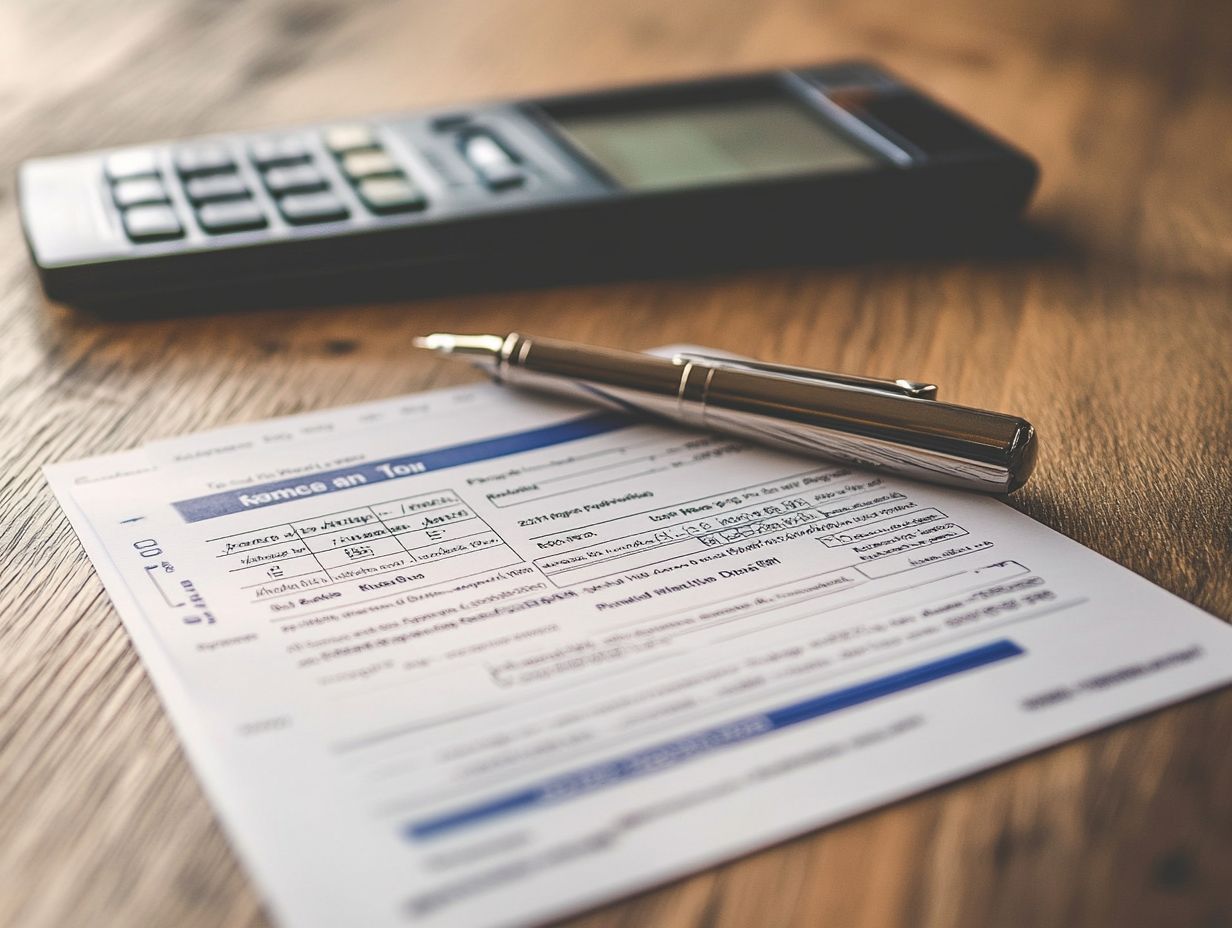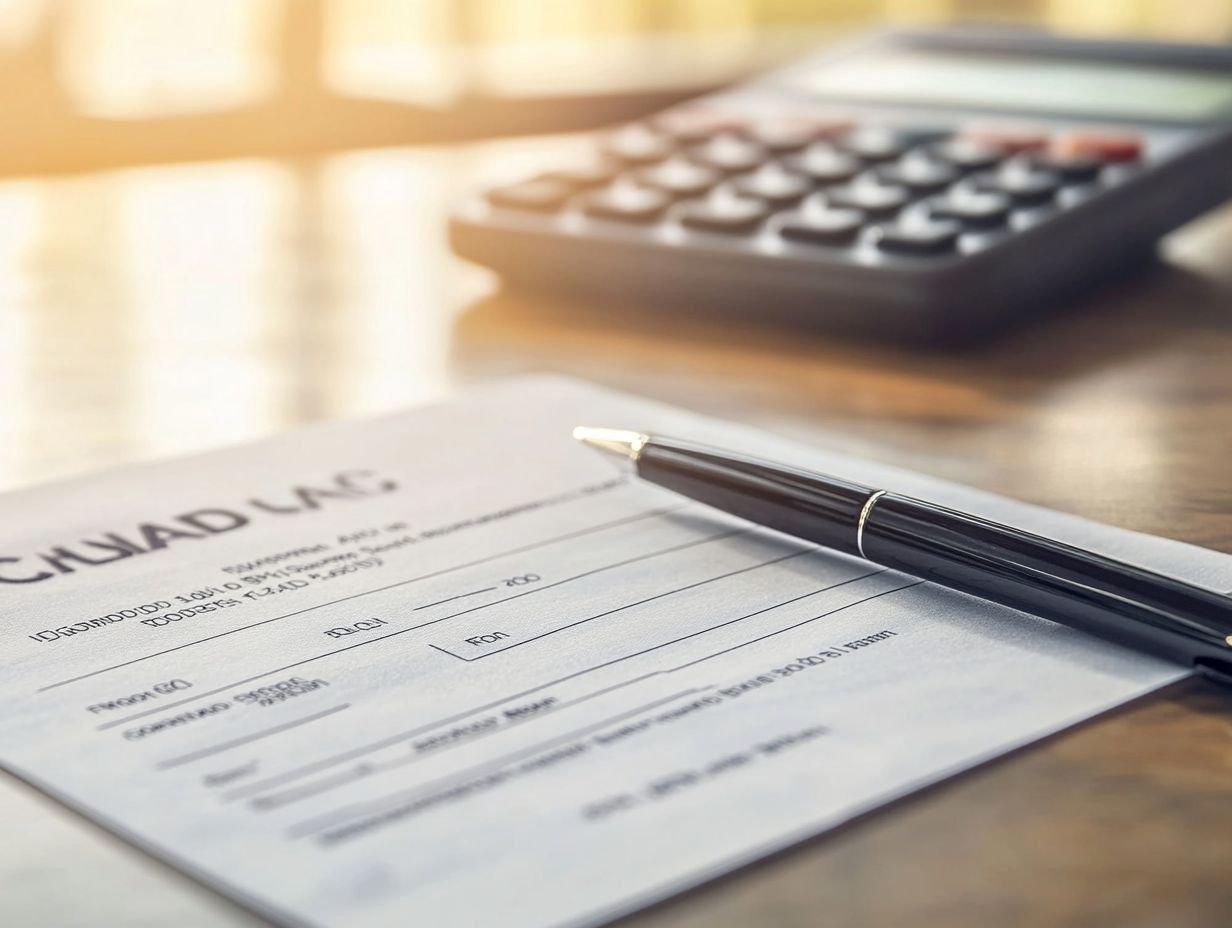Understanding Credit Card Application Requirements
Credit cards are formidable financial instruments that can elevate your purchasing power and aid in the construction of a robust credit history.
Before you take the plunge, it s crucial to grasp their essence and the advantages they offer. Key considerations to keep in mind when applying are also important.
This guide will navigate you through the entire process from determining your eligibility to understanding the application procedure and what lies ahead.
Whether you re embarking on your first application or contemplating a card switch, this guide equips you with all the insights necessary to make an informed decision.
Contents
- Key Takeaways:
- Understanding Credit Cards
- Why Apply for a Credit Card?
- Factors to Consider Before Applying
- How to Apply for a Credit Card
- Documents and Information Needed
- What Happens After You Apply
- Frequently Asked Questions
- What are credit card application requirements?
- What are the common credit card application requirements?
- Do I need a good credit score to apply for a credit card?
- Can I apply for a credit card with a low credit score?
- What documents do I need when applying for a credit card?
- How can I improve my chances of getting approved for a credit card?
Key Takeaways:

Here s what you need to know before applying:
- Credit cards offer numerous benefits, such as building credit history and earning rewards, making them a useful financial tool.
- Before applying for a credit card, consider eligibility requirements, interest rates, and fees to ensure it is the right fit for your financial situation.
- The credit card application process involves providing necessary documents and personal information; the approval process can take time before you receive your card.
Understanding Credit Cards
Grasping the nuances of credit cards is essential for anyone aiming to manage their finances with finesse. These tools can profoundly influence your credit score and overall financial well-being.
With their myriad features, credit cards provide a powerful avenue for building a robust credit report through responsible usage. This ultimately paves the way for more favorable interest rates on loans and mortgages.
They also play a key role in important areas like payment history and credit utilization. For this reason, it’s vital to comprehend how they function and the implications they hold for your financial future.
What are Credit Cards?
Credit cards serve as useful tools that enable you to borrow funds up to a specified credit limit. This allows for purchases that you can repay over time, often with interest.
They come with an array of features, such as the option to add an authorized user, which can enhance your credit history and improve your credit utilization ratio (the amount of credit you use compared to your total available credit).
Typically crafted from plastic or metal, these cards are equipped with a magnetic strip or chip that securely holds vital account information.
You ll find a variety of credit card types available, including:
- Secured credit cards, which require a cash deposit as collateral and are excellent for those aiming to establish or rebuild their credit scores.
- Rewards cards, designed to offer cash back or points for every dollar spent, making your purchases work for you.
- Balance transfer cards, which allow you to shift existing debts to lower interest rates, providing financial relief.
Understanding the intricacies of each type gives you the power to select the option best suited to your financial goals.
Why Apply for a Credit Card?
Applying for a credit card opens the door to exciting benefits that can transform your financial landscape! Not only can it improve your credit score, but it also grants you access to enticing rewards and cash back options that amplify your purchasing power.
Many credit cards offer features like a complimentary credit score dashboard, allowing you to keep a keen eye on your financial health. By managing your credit card usage responsibly, you position yourself to build a robust credit history.
This paves the way for access to superior financial products and the advantage of lower interest rates. Don’t miss out on the chance to enhance your purchasing power today!
Ready to take control of your finances? Start your credit card application process now!
Benefits and Advantages
The benefits and advantages of credit cards are extensive, making them an essential financial tool for countless consumers. By building a positive payment history, you can enhance your credit score directly. Choosing the right credit card offers you financial flexibility and security. Imagine reaping the rewards through a rewards card!
When you use a credit card wisely, you open the door to lower interest rates on future loans. A strong credit history grants you access to more favorable terms. Many credit cards offer generous cash back programs on everyday purchases, allowing you to save money on your spending. Over time, those savings really add up!
This convenience simplifies personal budgeting by making expense tracking easier, enriching your overall shopping experience. Plus, the added layer of consumer protection ensures you can shop with peace of mind, making it a savvy choice for many.
Factors to Consider Before Applying

Before applying for a credit card, it’s vital to take a moment to look at a few important factors that may influence your eligibility and future financial well-being. This includes your current credit score, your credit report, and your overall credit history.
By grasping these elements, you empower yourself to make informed choices about which credit card best suits your financial aspirations and requirements.
Eligibility Requirements
Credit card eligibility can differ based on the issuer and the specific type of card, but it generally hinges on your credit score and credit report. Factors like outstanding balances and payment history are crucial in determining whether your application gets the green light.
Additional factors such as your income level, employment status, and existing debts can also sway the final decision. A higher credit score, typically above 700, unlocks doors to premium cards offering better rewards and lower interest rates. Conversely, if your score is lower, you might encounter restrictions or higher fees, as lenders view you as a higher-risk borrower.
It s essential to recognize that if you ve had recent missed payments or a history of defaults, securing favorable credit options may become even more challenging. Understanding these criteria helps you tailor your approach to obtaining the right credit card for your needs.
Interest Rates and Fees
Interest rates and fees associated with credit cards can vary significantly, impacting your overall borrowing costs. If you tend to carry a balance, consider low-interest cards. However, be cautious of annual fees, as they can diminish the advantages these cards offer.
Understanding how these rates are determined is essential. They’re typically influenced by factors like market trends, credit scores, and the issuer’s policies. Your creditworthiness, which reflects how lenders assess your ability to repay borrowed money, plays a pivotal role in the interest rate you receive.
Beyond interest, credit cards often come with various fees think late payment fees, foreign transaction fees, and balance transfer fees all contributing to your total expenses. Being aware of these costs empowers you to make informed decisions about which card aligns with your financial needs.
How to Apply for a Credit Card
Applying for a credit card entails a series of thoughtful steps starting with a clear understanding of your credit score. This foundational knowledge allows you to identify the credit card options that best suit your financial landscape.
It s imperative to complete your credit application with precision, as this influences your chances of approval and impacts your credit history when a hard inquiry is conducted.
Step-by-Step Guide
A step-by-step guide to applying for a credit card starts with the essential task of researching various financial products to find one that aligns perfectly with your needs. It’s crucial to understand the credit application process and gather all necessary documents in advance to streamline your approval journey.
In this initial phase, you ll want to evaluate different credit offerings, whether they be rewards cards, low-interest options, or secured cards. Each option should be tailored to your financial situation and credit score. Once you ve narrowed down a few promising contenders, make sure you have your personal information ready think income details, employment history, and your Social Security number.
It s vital to meticulously review each card s terms and conditions. Pay close attention to fees, interest rates, and rewards programs. With this groundwork laid, you can proceed to fill out the application form either online or in person confidently ensuring that all the information you provide is accurate to avoid any delays or rejections.
Documents and Information Needed

When you apply for a credit card, you will need to gather certain documents and personal information. Knowing what to include in your credit card application can help streamline the application process and evaluate your credit health.
Typically, you will need to provide identification, proof of income, and information regarding your existing credit history.
Required Paperwork and Personal Details
When applying for a credit card, gathering specific paperwork and personal details is essential. This includes identification, income verification, and possibly your existing credit report, which is a document that shows your borrowing history.
Each type of documentation plays a crucial role in the approval process. For instance, recent pay stubs are critical; they illustrate your current income, helping lenders determine your capacity to repay debts. Tax returns provide a comprehensive view of your financial stability over time and highlight any additional income sources.
By submitting a recent credit report, you enable issuers to examine your credit history. They can pinpoint past payment behaviors and current debt levels, which are critical in determining the terms and limits of your prospective credit card.
What Happens After You Apply
Once you apply for a credit card, the approval process begins with a thorough review of your credit report and an assessment of your credit score. This evaluation is pivotal, as it determines your eligibility for the card you’ve chosen.
The outcome can change everything for you! It will significantly influence the credit limit and interest rates that you may be offered.
Approval Process and Next Steps
The credit card approval process encompasses several key steps, beginning with a comprehensive evaluation of your credit report and score. This ultimately determines your credit line and terms. Understanding this process gives you the power to manage your expectations and effectively prepare for the next steps after you submit your application.
You can expect to receive a decision within a matter of minutes to several business days, depending on the lender s workflow and the intricacies of your application. If you receive approval, your new credit card will likely arrive in the mail shortly thereafter, allowing you to start utilizing your credit line.
If your application is denied, you ll receive a notification outlining the reasons, whether it s a low credit score or insufficient income. It s crucial for you to carefully review this feedback, as it can offer valuable insights for improving your financial standing and strengthening future credit applications.
Frequently Asked Questions
What are credit card application requirements?

Credit card application requirements refer to the criteria that an individual must meet to successfully apply for a credit card. Understanding the credit card application process is essential, as these requirements vary depending on the credit card issuer and the type of credit card being applied for.
Ready to take control of your finances? Start your application today!
What are the common credit card application requirements?
To apply for a credit card, you need to be at least 18 years old. A good credit score, proof of income, and a valid ID like a driver’s license or passport are also required.
Do I need a good credit score to apply for a credit card?
Yes, a good credit score is usually required. It shows you have responsibly managed your debt and are likely to pay your credit card bill on time.
Can I apply for a credit card with a low credit score?
You can apply even if your credit score is low. However, you might need to consider a secured credit card, which requires a deposit, or a card designed for those with poor credit.
What documents do I need when applying for a credit card?
Prepare documents like pay stubs or tax returns to prove your income. You ll also need a valid ID and possibly additional documents like bank statements.
How can I improve my chances of getting approved for a credit card?
Check your credit score and work on improving it if necessary. Make sure you meet all the application requirements and have your documents ready. Get ready to boost your chances!






